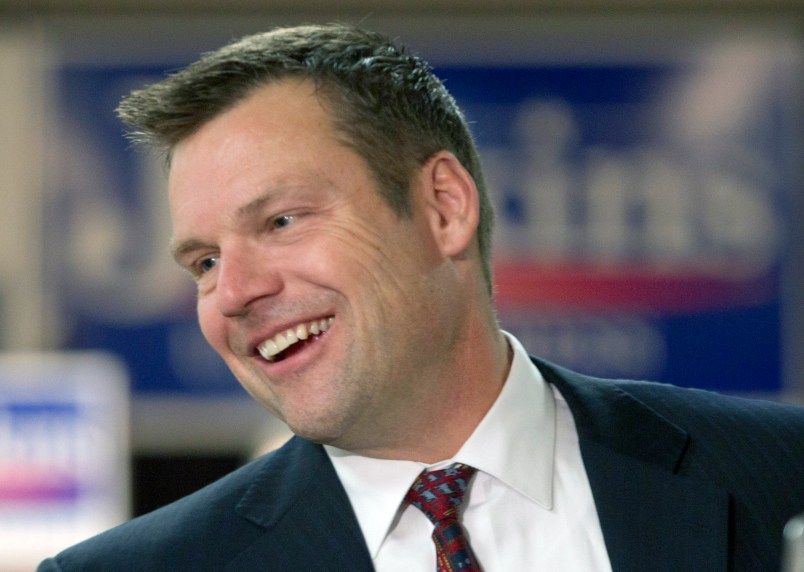In the wacky world of Kansas politics, the big question is whether the GOP secretary of state’s decision to keep the Democratic nominee on the Senate ballot is ultimately a bad thing for Democrats. Go figure.
The (allegedly) well-laid plans of Democrats in the Kansas Senate race were seemingly undone Thursday when Secretary of State Kris Kobach (R) declared that Chad Taylor, the Democratic nominee who said he was withdrawing from the race, would remain on the ballot in November.
Democrats’ apparent gambit was to get Taylor to clear the field for independent candidate Greg Orman, who flirted with running for Senate as a Democrat in 2008, to challenge incumbent Sen. Pat Roberts (R-KS). Democratic voters would presumably line up against anybody-but-Roberts, who would now be Orman with no Taylor to vote for, and a Republican incumbent would unexpectedly lose re-election in a national landscape where control of the Senate could come down to a single seat.
Taylor has said he will challenge the decision by Kobach, a member of Roberts’ honorary campaign committee. But if the countermove stands, would it undo the Democratic gambit? Maybe, according to a local political scientist. At best, it would leave Orman with an exceedingly narrow path to victory.
Bob Beatty, a Washburn University political science professor, laid out the math to TPM on Friday. The midterm Kansas electorate is usually 50 percent Republican, 30 percent Democrat and 20 percent unaffiliated, he said. Here is how Beatty described Orman’s winning coalition against Roberts.
First, more than 90 percent of Democrats need to vote for Orman. Second, Orman needs to win over more centrist Republicans, who have been alienated by the party’s rightward turn under Gov. Sam Brownback, and take at least 30 percent of the overall GOP vote. Lastly, he needs to turn out actual independents and win them convincingly.
That isn’t easy on its own. But if Taylor stays on the ballot, then it becomes all the more difficult. It’s possible as much as 15 percent of the Democratic base would simply check the name with the D next to it, no matter what is happening in the actual campaign, Beatty said. That would be a serious blow to the winning path that Orman should be seeking.
“I think it’s up to Orman to figure out a campaign message that really lets Democrats know and turns them out,” Beatty said, but without allowing Roberts to brand him a partisan Democrat and driving the moderates back to the incumbent.
“It’s a tough task. It’s never been done,” Beatty said. “It’s doable. It’s just obviously not a slam dunk.”
Orman’s strong polling is part of the reason that Democrats are believed to have asked Taylor to step down. An Aug. 19 Public Policy Polling found Orman leading Roberts 43 percent to 33 percent in a hypothetical match-up without Taylor. But it’s hard to know how it would all shake out if Taylor’s name were still on the ballot, but the man himself was not actively campaigning.
Daniel Nichanian, a University of Chicago doctoral student who helps cover elections for the Daily Kos, rounded up some recent examples of races where a candidate had dropped out of the race but stayed on the ballot. He found that the candidate-in-name-only attracted between 2 to 6 percent of the vote. That would certainly narrow Orman’s chances if, as Beatty outlined, he needs to attract 90-plus percent of Democrats to win.
It’s all guesswork at this point. As TPM’s Josh Marshall pointed out Thursday, Roberts is clearly struggling: He’s been polling at 35 percent, according to TPM’s PollTracker average. That’s not the number of an incumbent who can cruise to victory, which explains why national Republicans are sending in the campaign cavalry.
But if the math here is right, Kobach has probably bettered Roberts’ odds.







And this children is why ballots and the running of elections doesn’t
belong in the hands of elected partisan officials.
Example…Canadian elections are managed by Elections Canada who have no party affiliation to speak of. They manage the voters lists, set up the polling stations, get the ballots out without overt interference from any party.
At the end of the day…much less opportunity for anyone to
manipulate results
Tradition be damned. Roberts was in trouble from the get go. I don’t think Kobach’s chicken sh*t gambit is enough to save Roberts. Orman’s problem is he is doing all of his own talking on his commercials and he doesn’t exactly have a great voice. His message is spot on and running against elected Republicans after Brownback’s purge of all of the moderate Republicans from state government and his general Koch inspired misadministration isn’t all that hard in Kansas this year.
Oh look, Dylan Scott is learning to write Kapur-like headlines!
Someone is on the TPM fast track!
I would like to take issue with the following wording:
No, Democratic voters are not going to line up against the Republican candidate’s opponent. The phrase should read:
Democratic voters would presumably line up behind anybody-but-Roberts…
Or possibly even better:
Democratic voters would presumably rally behind anybody-but-Roberts…
Taylor can advertise, and should. Run ads saying “Don’t vote for Chad Taylor.” Have Taylor explain the issues, why it’s vital to vote against Roberts, AND, by the way, why Kris Kobach needs to be run out of the state as well. Make him appear an honest man, a truth teller, spend some money on that, and not only will Orman win but you’ll set Taylor up for state office down the road.